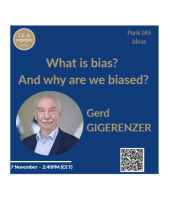What is biais? And why are we biased?
Online conference by Gerd Gigerenzer, former director of the Max Planck Institute for Human Development, director of the Harding Centre for Risk Literacy at the University of Potsdam, vice-president of the European Research Council (ERC) and fellow for one-month writing residency at the Paris IAS for the month of November 2025, as part of the "Paris IAS Ideas" series.
The ‘Paris IAS Ideas’ online lecture series offers short, stimulating presentations by researchers from the Paris Institute for Advanced Studies, marking the start of their one-month writing residency.
Session exclusively online and in English. Open to the public. Free upon registration.
Registration is required via the form at the bottom of the page to receive the login link.
Presentation
This project explores the concept of ‘bias’ and the multiple ways in which it is interpreted. The same behaviour can seem both rational and irrational: following base rates is consistent with Bayes, but can be perceived as prejudice.
A similar tension arises between disciplines: in behavioural economics, rationality is synonymous with absence of bias, while in machine learning, a certain amount of bias is essential to produce reliable predictions and avoid overfitting.
The online conference will propose that this contradiction can be resolved by Savage and Simon's distinction between ‘small worlds’ and ‘big worlds’. In a small, perfectly known world, bias is harmful. But in the uncertainty of large worlds, it becomes a rational and functional tool: bias is no longer a flaw, it is a strategy.

|
|
|
What is bias? And why are we biased? 01 November 2025 - 30 November 2025 |
|
|


